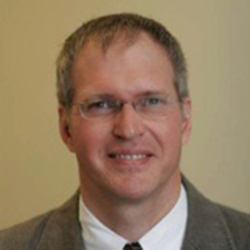Many think of economics as a technical, mathematically-driven discipline that aspires to be value neutral. Professor Dean Peterson, Associate Professor of Economics in the Albers School of Business and Economics is continuing his work with the Center to challenge this assumption. He will oversee a revision of the business and economics curriculum at Seattle University to draw out what he sees to be the ethical assumptions standing behind the study of economics. In this interview with MSBA student and former Graduate Assistant for the Center, Evin Tolentino, Professor Peterson responds to questions about this important, interdisciplinary work.
Professor Dean Peterson, Faculty Fellow, Center for Business Ethics
ET: What led you, an economist, to the field of ethics and to your work as a Faculty Fellow?
DP: My work originates from a problem I see in how the discipline of economics presents itself to the public and to our students. The problem is actually reflected in the very question you’re asking—it implies a curiosity in the fact that an economist would be interested in ethics. It assumes the two fields of study are independent or can be divided. But this separation is, in fact, impossible. The point of economics is to promote the welfare of society. To promote the welfare of society, one must first have a conception of welfare—a notion of the good. So the overall project must begin with a foundational ethical question—what is good—and move to more technical questions of what social arrangements help us realize the good.
Unfortunately, it’s the technical part of the project that we emphasize in our classrooms and highlight in our writings. A well trained economist knows that our work is part of a greater project of determining the structure, rules and policies for a good society. Within that greater project are questions that can be labeled “economic.” What, for example, are good economic institutions? Good public policy? Good laws? We know these are the big questions. But, again, we tend to focus on the technical aspect—the equations and graphs— and everyone who has taken an economics class knows what I am talking about. This is the problem. People come to see economics as applied mathematics or as a science that contains no ethical content.
ET: You and Professor Marc Cohen have a recent publication in the Journal of Business Ethics. Is this article related to the problem you describe?
DP: Definitely. Our article is a reaction to a relatively new line of thought in business ethics—one that attempts to construct a complete account of the ethical responsibilities of business based simply on the modern economic notion of efficiency. I don’t know if I am speaking for Professor Cohen, but I think the idea of building a theory of business ethics on economics is backwards. Economics, as I said earlier, sits upon ethics. Please don’t get me wrong. I’m an economist. I think efficiency is important. But we can’t treat efficiency as an end. In economics, efficiency means efficiency with respect to consumer preferences. An economy is efficient when it produces the goods and services its citizens’ desire. That’s a good thing. But it isn’t everything. Whose preferences should be served? Are all preferences equally valuable? Should all desires registered in the market be considered equally worthy? Are such desires the only thing that is important? Is that the only indicator of a good society? Efficiency with respect to preference satisfaction is simply too narrow a vision for a comprehensive approach to the ethics of business conduct.
ET: So, what do you hope to accomplish during your fellowship term?
DP: As part of my fellowship term the Center will provide support for a diverse group of faculty who teach introductory microeconomics and business ethics. They will address the problem I already mentioned—the misleading separation of ethics and economics. I will oversee this work in order to eventually revise the Albers School curriculum to help students see that it isn’t economics vs. ethics, or efficiency vs ethics. We are going to revise these classes to make it clear to students that their studies in economics were informed by an underlying set of ethical commitments. And we are going to make the same point in our business ethics classes—when students studied economics early in their careers they already—if implicitly—grappled with ethical questions. We want our students studying ethics to see themselves as expanding and critiquing a discussion underway. In the end, we want our students of this Jesuit University to constantly ask, “how will different people and different societies live together well upon this earth?” And, from that question, ask further “how will business and economics contribute to this goal?” Students need to see the complexity of these questions. And they need to see that their own vision must reflect that complexity.

